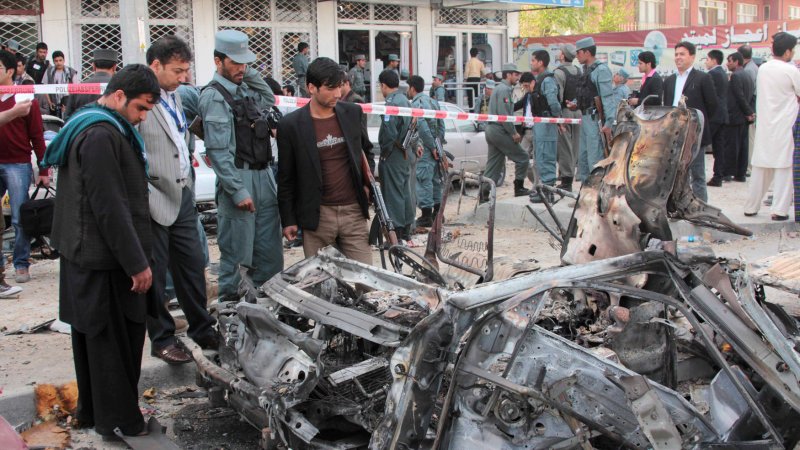1 of 5 | Afghanistan military secure battle zone as they regained control of Kabul on April 16, 2012, after an 18-hour attack by the Taliban on the capital city that paralyzed Kabul's government district and left 36 insurgents dead. Afghan President Hamid Karzai blamed NATO and the Afghan military for the lack of intelligence to allow the attack to happen. UPI |
License Photo
KABUL, Afghanistan, April 16 (UPI) -- All fighting against Afghan insurgents ended Monday after 18 hours of fierce coordinated attacks in Kabul and other key population centers, officials said.
The last of the attacks, at the National Assembly, or Parliament, was quelled by 7:30 a.m. local time, the Afghan Interior Ministry said in a statement.
"The situation is normal," the statement said.
The U.S.-advised Afghan military called in helicopter gunships to target holdout insurgents in two Kabul buildings as the fighting raged until dawn, The Wall Street Journal reported.
The attacks on the Parliament, foreign embassies and Kabul military bases emptied the streets during a normally busy workday, the Journal said.
The attacks began almost simultaneously around 1:45 p.m. Sunday with sieges also in the eastern cities of Gardez, 60 miles south of Kabul; Jalalabad, 95 miles east of the capital, near Pakistan; and Pul-i-Alam, 40 miles south of Kabul, Afghan and U.S. officials said.
At least two Afghan police officers were killed and 14 were injured during the attacks, Afghan officials said, along with 27 Afghan civilians injured.
The Afghan government said at least 18 insurgents were killed and a dozen suspects were captured by Monday.
At least two Afghan university students were killed by insurgents during the Taliban assault in Gardez, residents told the Journal.
They were an early test for the Afghan National Security Forces, which responded with only minimal help from NATO, Western military officials said.
"No one is underestimating the seriousness of today's attacks," NATO commander U.S. Marine Corps Gen. John R. Allen said in a statement.
"Each attack was meant to send a message: that legitimate governance and Afghan sovereignty are in peril. The ANSF response itself is proof enough of that folly," Allen's statement said.
The Taliban took responsibility for the violence, calling it the opening salvo in this year's "spring offensive."
But Western officials in Kabul said the strikes had the earmarks of the Haqqani network, an autonomous militant part of the Taliban movement accused of staging the most devastating attacks on the Afghan capital in recent years.
"The Taliban are really good at issuing statements -- less good at actually fighting," U.S. Ambassador to Afghanistan Ryan Crocker told CNN's "State of the Union."
"My guess, based on previous experience here, is [that the attacks were] a set of Haqqani network operations out of North Waziristan [Pakistan, bordering Afghanistan] and the Pakistani Tribal Areas [also bordering Afghanistan]," he said. "Frankly, I don't think the Taliban is good enough."
The Haqqani network was nurtured by the CIA and Pakistan's premier intelligence agency during the 1980s Soviet war in Afghanistan, Switzerland's International Relations and Security Network reported in September 2011.
The U.S. Embassy in Kabul said Sunday its staff was on lockdown while the attacks unfolded and all of its personnel were accounted for and unhurt.















